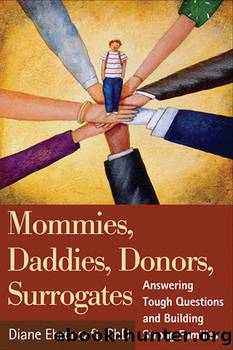Mommies, Daddies, Donors, Surrogates by Diane Ehrensaft

Author:Diane Ehrensaft [Ehrensaft, Diane]
Language: eng
Format: epub
ISBN: 978-1-60918-939-6
Publisher: Guilford Publications
Published: 2011-06-15T00:00:00+00:00
DISCLOSURE: THE SOCIAL TIDES ARE SHIFTING
Marcy is a mother who is now is her late forties. She came to consult with me about her son, Andrew, who is six years old. She is a lovely woman, soft-spoken and kind in her nature, thoughtful and reflective about her only child. When Andrew was a year old, his father, Cary, had had a head injury that left him with severe brain damage. Prior to that, Cary had been a very involved father, active in every aspect of Andrewâs daily care. Then he became a paraplegic. For several years Cary remained in the hospital, where Marcy and Andrew visited him regularly. Now Cary was being released from hospital care, and Marcy came to consult with me about forging a bond between Andrew and his father, who was still significantly impaired, both physically and cognitively. Over the course of the consultation I began to wonder about the circumstances of Andrewâs birth, given that Marcy was an older mother. With the time running out in our session, I asked Marcy directly. As is often the case in those moments, Marcy squirmed in her chair, sighed, and replied, âWell, thatâs a long story in itself.â
With few minutes to spare, she went on. âAndrew is a sperm-donor baby. Caryâs sperm count was so low, and given my age, odds were against us. So we decided on donor insemination, because we desperately wanted a child. We never really resolved if and what we would tell Andrew about being a donor-insemination child, but figured weâd have plenty of time later to sort it out. But then Cary had his accident when Andrew was just a little baby, and the whole issue of what to tell him just got shelved. And now I donât know what to do. Given Caryâs limitations and the long separation, itâs hard enough for Andrew to connect with his dad right now. Then to tell him that on top of that his dad is not his biological father might just make it worse.â
If Marcy had been pondering this question two decades ago and called on the experts in the field to help her, they most likely would have told her to keep the donor insemination a secret. Even before Caryâs injury, the medical field would have wanted to protect Caryâs dignity, sense of manhood, and feeling of legitimacy as Andrewâs father. Attempts would have been made to match the donorâs features to Caryâs so Cary and Marcy could gaze down at a son who looked like Cary and so no one would ever suspect that Andrew was not Caryâs son by blood. Two decades ago experts also believed that disclosure would be damaging not only to the father, but to the child, creating stigma, rejection, and damage to the childâs psyche. 4
In those years assessments of psychological harm and stigmatization of the child were consistently based on assertion, supposition, and belief, rather than carefully conducted studies of sperm-donor children. The experts could have simply said that the jury was out about the effects of the childâs knowing he or she was a sperm-donor baby.
Download
This site does not store any files on its server. We only index and link to content provided by other sites. Please contact the content providers to delete copyright contents if any and email us, we'll remove relevant links or contents immediately.
The Art of Thinking Clearly by Rolf Dobelli(8881)
The 5 Love Languages: The Secret to Love That Lasts by Gary Chapman(8551)
Mindhunter: Inside the FBI's Elite Serial Crime Unit by John E. Douglas & Mark Olshaker(7860)
Becoming Supernatural by Dr. Joe Dispenza(7129)
The Road Less Traveled by M. Scott Peck(6660)
Nudge - Improving Decisions about Health, Wealth, and Happiness by Thaler Sunstein(6651)
Enlightenment Now: The Case for Reason, Science, Humanism, and Progress by Steven Pinker(6423)
Win Bigly by Scott Adams(6334)
Mastermind: How to Think Like Sherlock Holmes by Maria Konnikova(6264)
The Way of Zen by Alan W. Watts(5818)
Factfulness: Ten Reasons We're Wrong About the World – and Why Things Are Better Than You Think by Hans Rosling(4035)
The State of Affairs by Esther Perel(3955)
Gerald's Game by Stephen King(3937)
Man's Search for Meaning by Viktor Frankl(3661)
The Confidence Code by Katty Kay(3580)
Thinking in Bets by Annie Duke(3545)
The Worm at the Core by Sheldon Solomon(2936)
Enlightenment Now by Steven Pinker(2927)
Liar's Poker by Michael Lewis(2824)
